Are you a proud new owner of a lab puppy? If yes, it will be a complete roller coaster. But is your labrador retriever puppy sleeping too much? Puppies sleep more than older dogs, and it is normal. Different dog breeds have different sleeping patterns. How much sleep your lab needs depend on various factors. We’ll cover all these factors affecting their sleep and sleeping positions.
how much do labradors sleep?
Dogs have different sleep requirements depending on age, breed, and size. Adult dogs typically need between 8 and 13.5 hours of sleep daily, while a lab puppy can sleep up to 20 hours.
Large-breed, older dogs and those with health issues require more than the standard rest. Sleep is essential for a dog’s physical and mental well-being as it helps its brain undergo electrical activity. Just like humans, the dog sleeps around 12 hours in 24 hours! Knowing the dog sleeping patterns will help you address concerns requiring vet attention or diet changes.
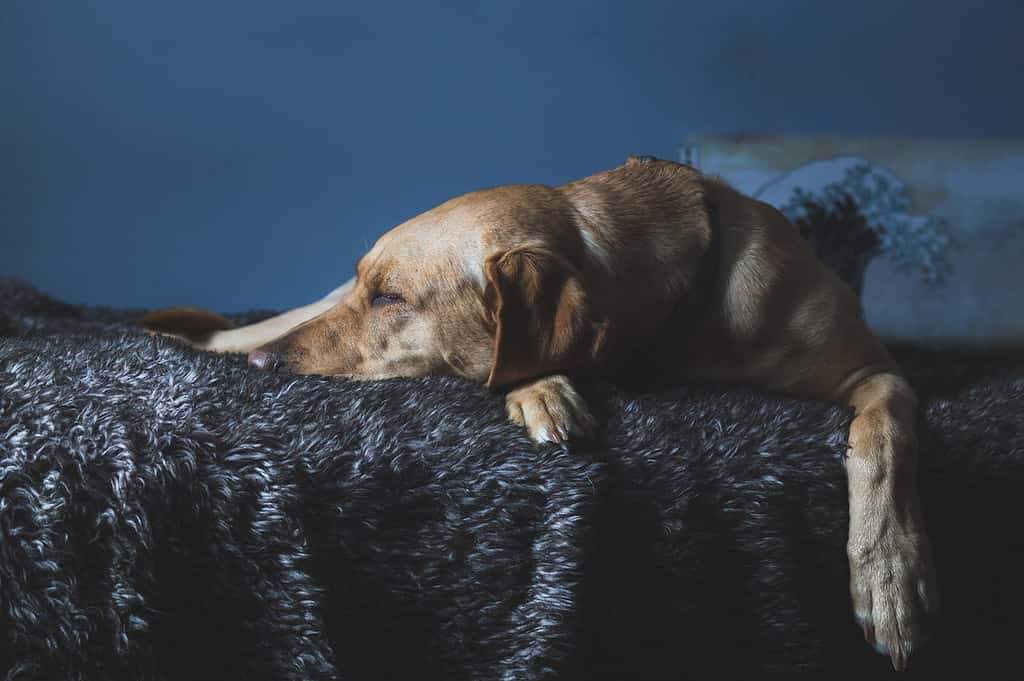
how much do labs sleep?
Labradors are known to be a relaxed and laid-back breed. It’s common for them to sleep up to 14 hours daily. Sleeping beyond this limit needs attention. As a lab puppy, Labradors can sleep 20 hours per day. An older dog has a slow metabolism, and they sleep more. Some Labs have a higher energy level than others and require more physical activity, leading them to rest frequently.
Pet owners must monitor their dog’s sleeping habits and notice any abnormalities. Signs of fatigue during usual activities must be addressed. Sudden changes in sleep could signal illnesses such as anemia or thyroid deficiency.
A vet check is required for abnormal behaviors concerning sleep quality. It is usual for Labradors to sleep quite often but do keep tabs on your fur baby’s habits. Too much or too little of something indicates problems!
My Dog Sleeps Too Much & Doesn’t Leave the Dog Bed Why?
As new dog owners, this can be vexing. However, a labrador retriever puppy is known to sleep for long periods. If your dog sleeps much more than usual, it’s worth investigating why. One possible reason is diet.
Your labrador puppy isn’t getting enough high-quality food or water, making them lethargic and sleepy. Another common cause is age. As dogs age, their activity levels decrease, and they need more rest. Lack of stimulation or boredom makes a dog less active and prone to napping.
Anemia also affects your furry friend’s energy levels, leading them to sleep extra. Most issues are treatable through lifestyle modifications. It includes diet changes or advanced medical interventions like thyroid hormone supplementation!
Diet
According to the Dog Aging Project study, daily feeding once is associated with better health in companion dogs, including Labradors. A labrador puppy must be fed a large-breed puppy diet rather than an adult or regular one. It suits their nutritional requirements better and prevents excessive sleepiness. A well-balanced and healthy diet helps your pet avoid low energy levels and lethargy.
Nature
Labrador dogs are hardwired to sleep for extended periods. In the wild, their ancestors spent most time resting and conserving energy for hunting and scavenging at night. Even though domesticated Labradors no longer fend for themselves, they still retain this instinctual behavior to sleep for many hours a day.
Their high melatonin hormone levels promote drowsiness, making them easily fall asleep. Don’t be alarmed if their Labrador sleeps more than usual due to nature’s influence. They must ensure their dogs receive enough daily exercise to burn off excess energy.
Lack of activity results in a bifurcated sleeping pattern and can add to weight gain and other health problems. Providing shaded areas during hot weather also promotes regular sleep schedules. It prevents disruption caused by heat exhaustion or dehydration.

Weather
Weather changes have a significant impact on your dog sleep patterns. During summer, dogs seek more excellent areas to escape the heat. On colder winter months, they may become less active and spend more time sleeping indoors.
Temperature impacts the labrador puppy sleep duration. Dogs sleep in cool areas away from direct sunlight or heaters to avoid discomfort. During hotter periods, ensure plenty of shaded areas for your furry friend.
Thyroxine Deficiency
Thyroxine deficiency, or hypothyroidism, is a common hormonal imbalance. It leads to lethargy and decreased activity. This happens when the thyroid gland does not produce enough hormones. The symptoms include weight gain in large dogs, hair loss, dry skin, and behavioral change. Note that fatigue caused by hypothyroidism is more severe than feeling tired after physical exertion or lack of sleep.
Thyroid diseases affect any dog breed, and you should have your pup regularly checked. Treatment includes daily medication to replace missing hormones or other treatments depending on the severity. Monitor your Labrador’s sleep cycle closely if they suspect thyroxine deficiency. Decreased energy levels coupled with excessive daytime sleepiness are crucial indicators.
Anemic
Dogs have low red blood cells in anemia. It limits their energy and stamina. Anemic dogs appear restless or sleep more than usual, even when fully fed and well-rested. It happens due to bleeding disorders caused by injuries or surgeries resulting in severe blood loss.
Pet owners must seek veterinary attention if they suspect anemia. It can indicate other underlying health issues like iron deficiency in infancy. Altered normal development of sleep patterns and long-lasting neurofunctional effects occur despite iron treatment. Proper treatment involves identifying the underlying cause of anemia and treating it through medication, supplements, diet changes, or transfusions.
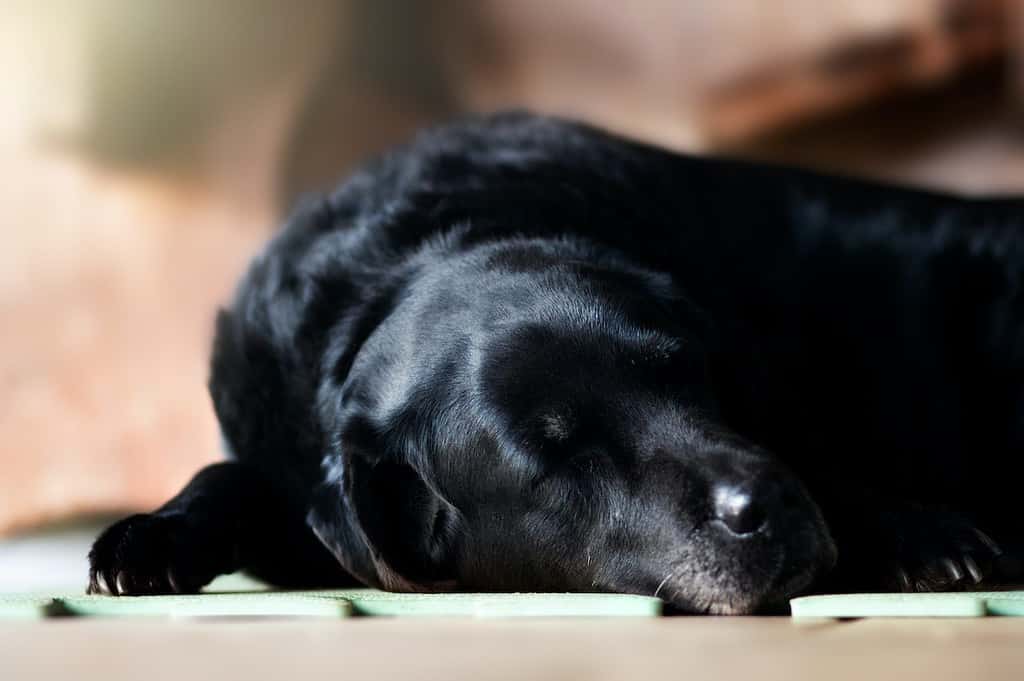
Boredom
Boredom is a common reason why dogs sleep more than usual. It can happen to any dog breeds, a large dog or a smaller dog. Dogs with inadequate mental and physical stimulation quickly become bored. It leads to several behavioral problems in labrador retrievers. Signs of boredom include destructive behavior, constant whining or barking, making escape attempts, and sleeping for longer hours a day.
- Provide them with plenty of playtimes and mental stimulation.
- Provide toys to your dog when you’re not around. Puzzle toys of different stages that require problem-solving skills improve their cognitive abilities.
- Taking your Lab out for walks regularly is another crucial aspect that should be considered.
Activity Level
Lack of daily exercise in modern dogs leaves them feeling restless and bored. It leads them to take longer naps during the day. Adult Labradors need at least an hour of exercise daily to stimulate them physically and mentally.
Enough physical activity enables puppies to get some shut-eye without interruption. Over-exercising, however leads to fatigue or exhaustion. It affects their sleeping habits negatively.
Aging
A dog’s sleep cycle changes with age. They may start sleeping more, which is usually normal but can indicate health problems. Senior dogs will slow down due to physical changes and issues like arthritis, cognitive dysfunction syndrome (CDS), or thyroid dysfunction.
- Provide a warm bed in a cool room where they feel secure at night.
- Monitor any abnormal behavior or pattern that could signal pain or discomfort.
- Aging brings significant changes in a dog’s life. Mobility limitations or chronic illnesses also affect their quality of life.
- Look for medication management strategies explicitly tailored towards older pets’ unique needs.
- Taking good care of your senior pet’s overall health helps them remain active and engaged.
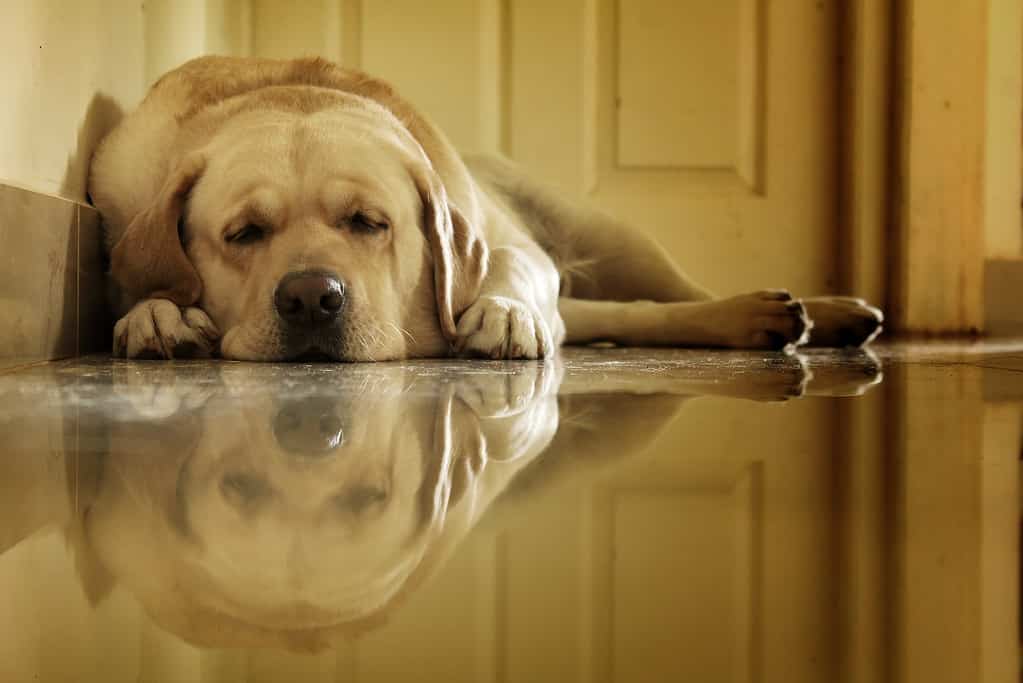
how long do labradors sleep at night?
A lab puppy sleeps throughout the day and night till about four months old. Adult Labradors often sleep for over half of every 24 hours. It’s common for a Labrador to wake up in the middle of the night for potty breaks.
- Does your older lab wake up in the middle of the night or seem restless?
- Creating their own space or dog bed away from others will benefit them.
- If your Labrador sleeps much more than usual or appears lethargic during waking hours, consult your veterinarian.
Labrador Sleeping Position & What It Tells:-
Labradors, like most dogs, have various sleeping positions. Your Labrador’s position reveals a lot about their comfort levels and mood.
- If your lab puppy likes to sleep on their back with all four legs in the air, they feel relaxed and safe.
- If they prefer to sleep curled up into a ball, it suggests they are anxious or chilly.
Does your Labrador frequently sleep stretched out rather than huddled up against something solid for support? Could you provide them with an orthopedic bed? It is great for older dogs needing more joint support. Also, remember to provide comfortable bedding materials, and allowing enough space to snuggle leads to happier and healthy pets!
Different Sleeping Positions
While “Crazy Legs” isn’t a commonly known term, dogs can have some wild sleeping positions.
- One example is when they sleep on their backs with all four legs sticking straight up in the air. The “passed out” position indicates that your Labrador feels comfortable and safe enough to open up.
- Another interesting sleeping position is when dogs curl themselves into a ball. They draw their nose towards their tail – this one’s called the “belly curl.” It helps them conserve body heat while keeping themselves protected from threats.
- A third curious way of snoozing is lying back-to-back with another dog or human. It suggests bonding as well as closeness.
Odd-looking positions might seem amusing, but it’s usually nothing to worry about. Observe your labrador puppies for signs of discomfort.
Side Sleeping
Side sleeping is popular among other dogs as well. Dogs lie on their sides with extended legs, allowing for a more comfortable and relaxed sleep. It helps in regulating body temperature by increasing air circulation.
Does your Labrador sleep curled up with its legs tucked towards its belly, nose, and hindquarters curved together? This position is common too. It helps them feel safe and protected while they rest. Abnormal changes in your Labrador’s sleeping patterns lead to unusual sleeping positions such as side sleeping.
Superman
The “Superman” pose is among the less common ones. It involves a dog lying on its stomach with its front legs stretched forward and its hind legs extended behind them. While this looks uncomfortable, it can be a comfortable position for dogs to take short naps or relax.
Different positions indicate health issues if observed over an extended period. The Superman pose itself is not necessarily concerning but do monitor your Labrador’s sleeping position pattern regularly.
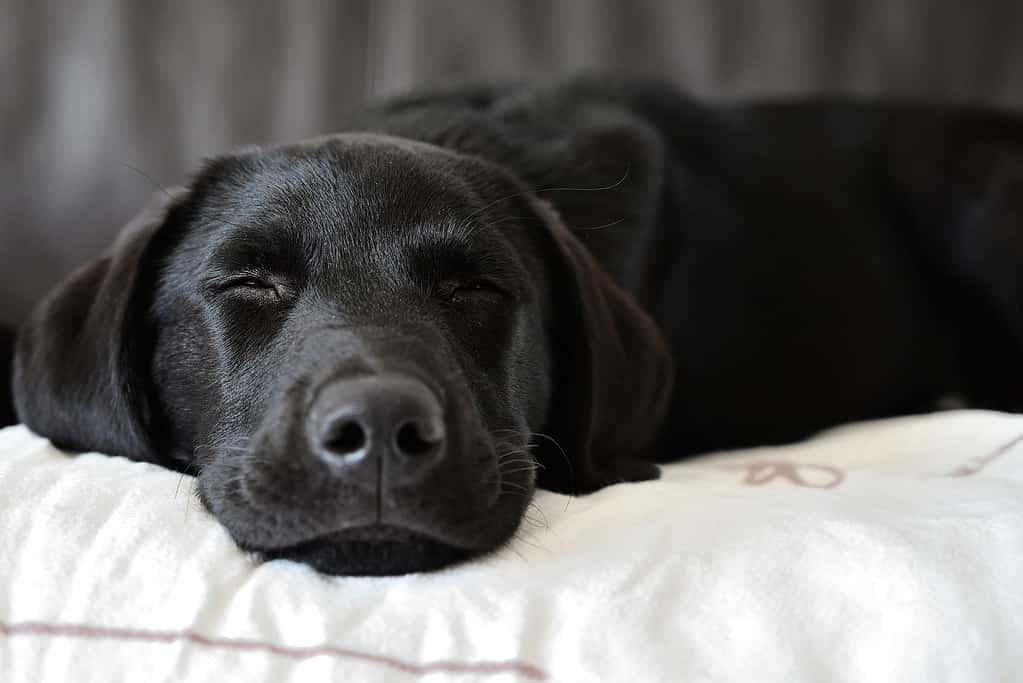
Passed Out
If your Labrador suddenly collapses and lies motionless on the ground, they might have passed out. Syncope is a possible cause of fainting in dogs resulting from a lack of normal blood flow to the brain. It is more common in older dogs than in young ones.
Passing out could be due to sleep disorders such as narcolepsy. It primarily affects young dogs. Sudden unexpected death in pets can be caused by heart disease, trauma, and toxicity. Consult a vet if you notice any unusual dog behavior.
Belly Curl
Labradors tuck their legs towards their body and curve their hindquarters together in the belly curl. It helps dogs feel secure, protecting their vital organs while keeping them warm. The belly curl shows your Labrador is relaxed and comfortable in his surroundings.
Belly curls indicate your pup’s overall health and well-being. If your Labrador suddenly starts to avoid the belly curl, it could be due to joint pain or discomfort.
The belly curl is just one of many sleeping positions that Labradors enjoy. Pay attention to your dog’s preferred sleeping habits. Gain valuable insight by it to keep your pup healthy.
Curly Sue
“Curly Sue” is another position where they curl tightly into a ball. It indicates your pup feels cold and is trying to conserve its body heat. It could be that they feel safe and secure in this position, which reminds them of their mother’s womb.
Back To Back
One of the interesting sleeping positions for Labradors is back-to-back. It involves two dogs sleeping against each other, backs touching. While this might seem cute, it has roots in ancestral pack behavior. The position helps protect vulnerable areas like the throat and stomach.
Labrador back-to-back sleeping also indicates closeness and bonding between two dogs or a dog and their owner. Dogs who feel safe and secure with their companions will likely sleep this way. Seeing your Labrador sleeping back-to-back with another pet or family member reflects trust and affection.
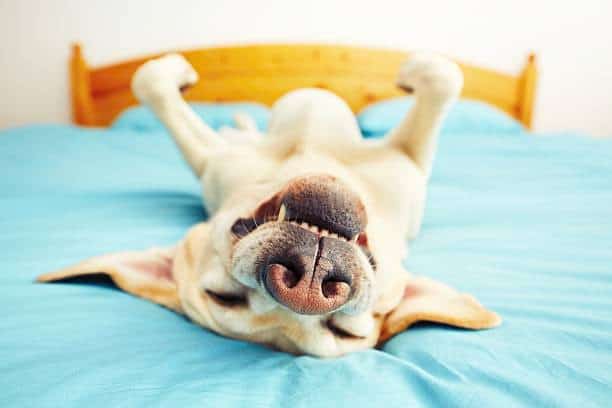
Should I Worry About Changes In Sleep Patterns?
Changes in the sleeping patterns of your Labrador can be a natural part of the aging process. Do keep an eye out for any sudden changes.
Adult Labradors can sleep up to 12 hours daily. Any significant increase or decrease in their sleeping habits may signal underlying health issues. Note these changes and bring them up with your veterinarian during regular checkups. Sudden shifts in your dog’s sleeping patterns could indicate boredom or anxiety.
Each dog has different sleep needs. Knowing what’s normal for your Labrador is critical when assessing if any drastic changes are happening. Keep track of their sleeping routine using a journal or tracker app. Maintain open communication with your vet. You shouldn’t worry too much about minor changes – but always stay alert!
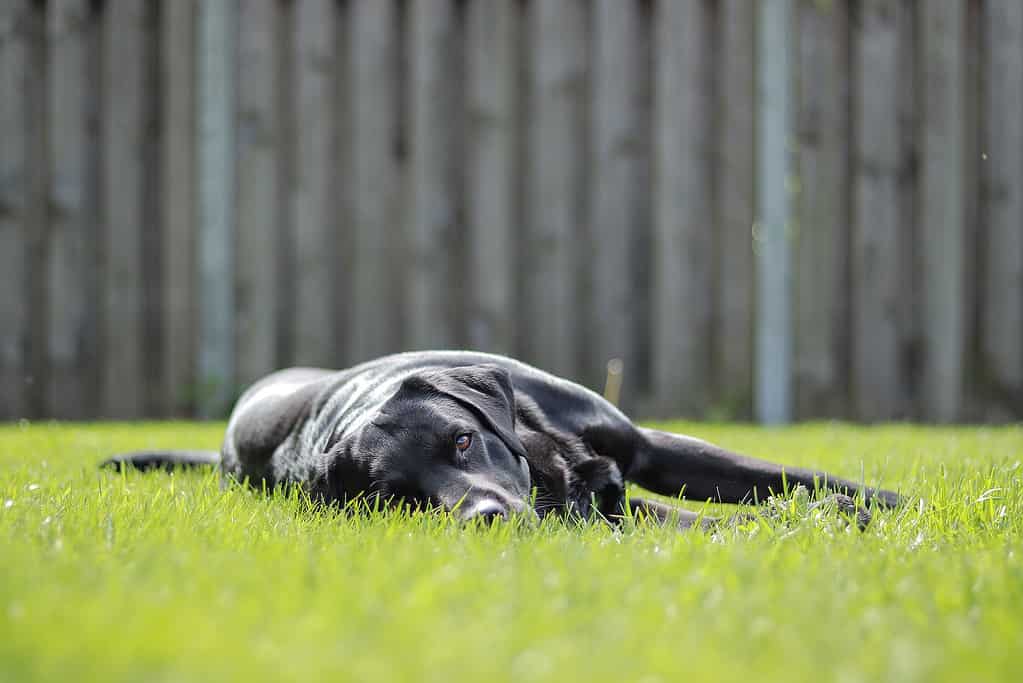
Why Is Your Labrador Sleeping Much More Now?
One common cause is age – older Labradors may require more rest and sleep. If your dog isn’t getting much exercise or playtime during the day, it may become bored and resort to sleeping. Sleeping a lot also results from diet or health issues such as anemia or thyroid deficiency. Suppose you notice changes in your dog’s appetite or energy levels. Some degree of variation in sleeping habits is normal.
5 Tips To Help Your Labrador Sleep Through The Night
If your Labrador is having trouble sleeping through the night, read the below tips.
- Ensure your dog exercises enough during the day to promote a good night’s rest. Mental stimulation is necessary to prevent anxiety at night.
- Creating a calm bedtime routine with plenty of relaxation helps your dog wind down and sleep. Dimming the evening lights and avoiding loud noises or sudden movements benefits. Labs have night vision.
- Crate training provides your Lab with a safe space to sleep securely. Introduce them gradually so it feels like a comforting place rather than punishment.
- Maintain consistent feeding schedules for a good sleep. So they don’t wake up hungry in the middle of the night, disturbing their sleep.
- Dogs sleep during hot weather. It maintains their average body temperature because overheating might disturb their sleep pattern.
Normal And Abnormal Sleeping Habits In Labradors
Abnormal sleeping habits occurs due to various reason. If your Labrador suddenly starts napping more frequently or seems lethargic during the daytime, it’s time to visit a vet. Do keep in mind dogs sleep more than once. This is called polyphasic sleep.
Circling and digging before sleeping are common among Labradors since these behaviors date back to their wild ancestors. They dig holes in the ground for warmth and security. Twitching or movement while sleeping indicates they’re dreaming or experiencing the REM (Rapid Eye Movement) sleep cycle like humans.
Circling And Digging
Circling and digging before sleep is an instinctual behavior deeply ingrained in dogs. It’s a way of marking their territory or creating a comfortable sleeping spot. Dogs circle because they’re trying to get comfortable. It also serves as a way of establishing ownership over that particular area.
Scratching the ground before sleep has similar associations. It makes the dog feel more secure by marking the spot with its scent. In the wild, this would help ward off predators while sleeping. Depending on the temperature, some ancestors dig their sleeping areas to create enclosed spaces. It provided warmth during cold nights.
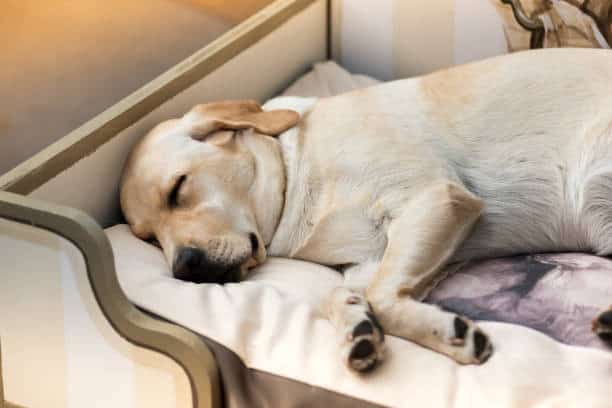
Twitching And Movement
During sleep, dogs experience different phases, including REM (Rapid Eye Movement) sleep. Dogs twitch or move their legs during this phase of deep sleep. Puppies tend to show more movement than adults because they spend more time in REM sleep as their brains develop.
Distinguish between normal twitching and a seizure because it may confuse. Twitching is usually rhythmic, and the dog will wake up after a few seconds or minutes without any signs of discomfort. Seizures involve uncontrolled jerking movements that can last several minutes. Drooling and loss of bladder control are also involved.
Aside from natural dreaming patterns, environmental factors like thunderstorms could trigger anxiety. It leads to agitation during the dog’s nap times. Help your pup sleep through the night peacefully
FAQ
Do older dogs sleep more?
An older dog needs more sleep than its younger counterparts. A senior dog can sleep as much as 18-20 hours daily.
Do labs know that nighttime is bedtime?
Dogs have circadian rhythms and are sensitive to day and night. They know when it’s time to sleep or when to eat. Past experience and circadian rhythms help the dog.
Should I sleep with my labrador retriever?
Sleeping with your labrador is alright till you both are healthy. Sharing your bedroom with a canine companion can be one of the best decisions.
Do labs pee in their sleep?
Female dogs may urinate a few drops in their sleep; however, it is rare in male dogs. The urine may not be enough to bother you, but it can cause a urinary tract infection.
At what age do lab puppies sleep through the night?
Young puppies sleep through the night by 16 weeks. When your labrador retriever reaches 4 months of age, they will begin to sleep at night.
How long do labs sleep per day?
Labrador Retrievers sleep for an average of 12-14 hours per day. Puppies sleep even more, for up to 18-20 hours per day.
When do lab puppies sleep through the night?
Lab puppies typically start sleeping through the night at around 4-6 months old. However, some puppies may take longer. If your puppy is still waking up at 6 months old at night, taking them to the vet is a good idea to rule out any medical problems.
Do lab puppies sleep a lot?
Yes, lab puppies sleep a lot. This is because they are growing and developing rapidly. They need all the sleep they can get to repair their bodies and consolidate their learning.
How many hours does a labrador sleep?
Adult labradors sleep for 12-14 hours per day. However, they may sleep for longer on weekends or days when they are not as active.
Why do labradors sleep so much?
There are a few reasons why labradors sleep so much. One reason is that they are a large breed dog. Large breed dogs typically need more sleep than smaller dogs. Another reason is that labradors are very active dogs. They need to sleep to recharge their batteries after a long day of playing or working.
Author Profile

- Lifetime dog Enthusiast
- Shradha is a seasoned writer at Labradorandyou.com, an authoritative resource for all things Labrador Retriever. Her experience as a pet owner and dog enthusiast drives her to create meticulously researched and fact-checked content, offering valuable insights on Labrador training, grooming, and health. Each article reflects Shradha's passion and dedication, enriched by personal experiences with her beloved Labradors, Tom, and Kurt. Whether exploring breed-specific training techniques or providing product reviews, Shradha ensures Labrador owners receive the most accurate, up-to-date, and trustworthy information, aimed at enhancing their companions' health and happiness
Also by the author
-
 Lab-TypesJuly 2, 2025Vovan Казино Официальный Сайт Казино С Азартными Играми
Lab-TypesJuly 2, 2025Vovan Казино Официальный Сайт Казино С Азартными Играми
-
 Lab-TypesJuly 2, 2025Download 1xbet APK Latest Version and Unlock the Best Betting Benefits
Lab-TypesJuly 2, 2025Download 1xbet APK Latest Version and Unlock the Best Betting Benefits
-
 casinoJuly 2, 2025“gerçek Paralı Casino Oyunları: Türkiye’de En İyi Siteler Ve Oyunlar
casinoJuly 2, 2025“gerçek Paralı Casino Oyunları: Türkiye’de En İyi Siteler Ve Oyunlar
-
 Lab-TypesJuly 2, 2025Zakłady Sportowe Online Firma Bukmacherska 1xbet
Lab-TypesJuly 2, 2025Zakłady Sportowe Online Firma Bukmacherska 1xbet





